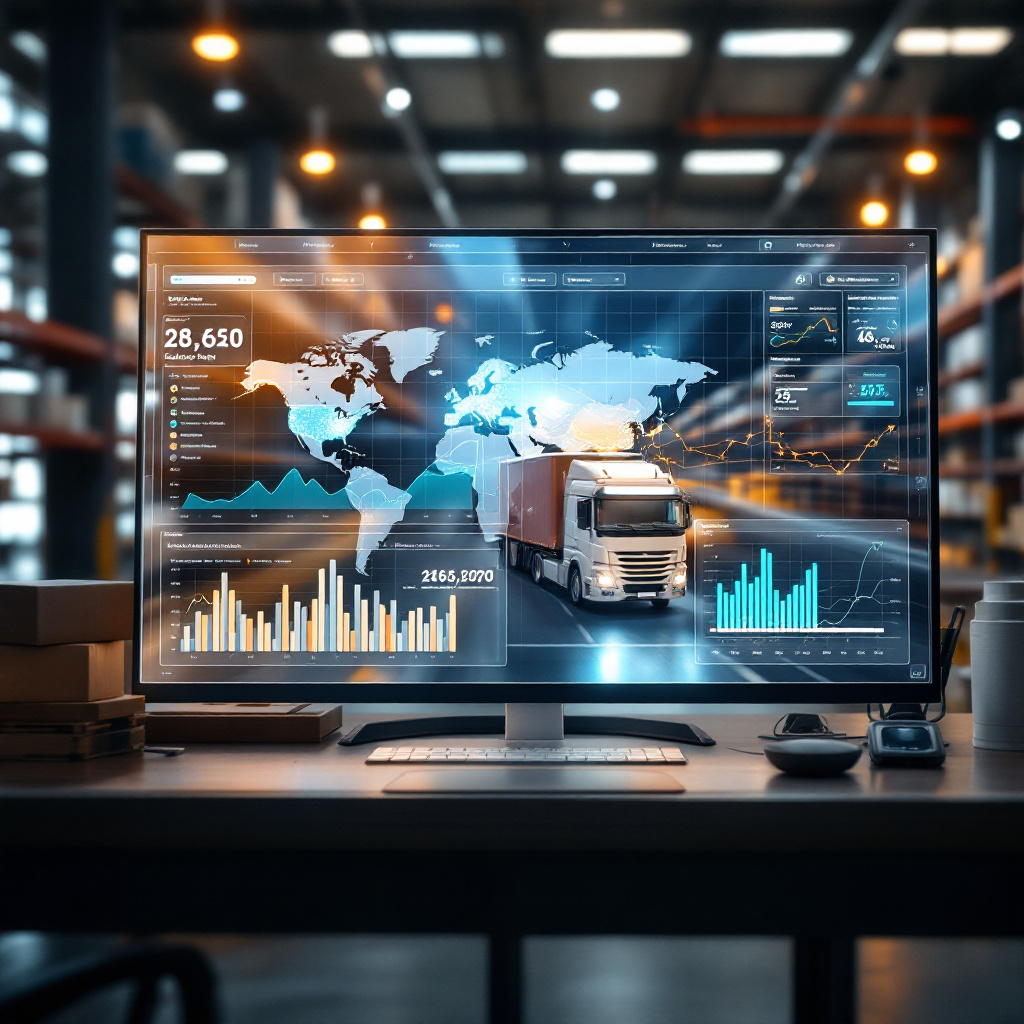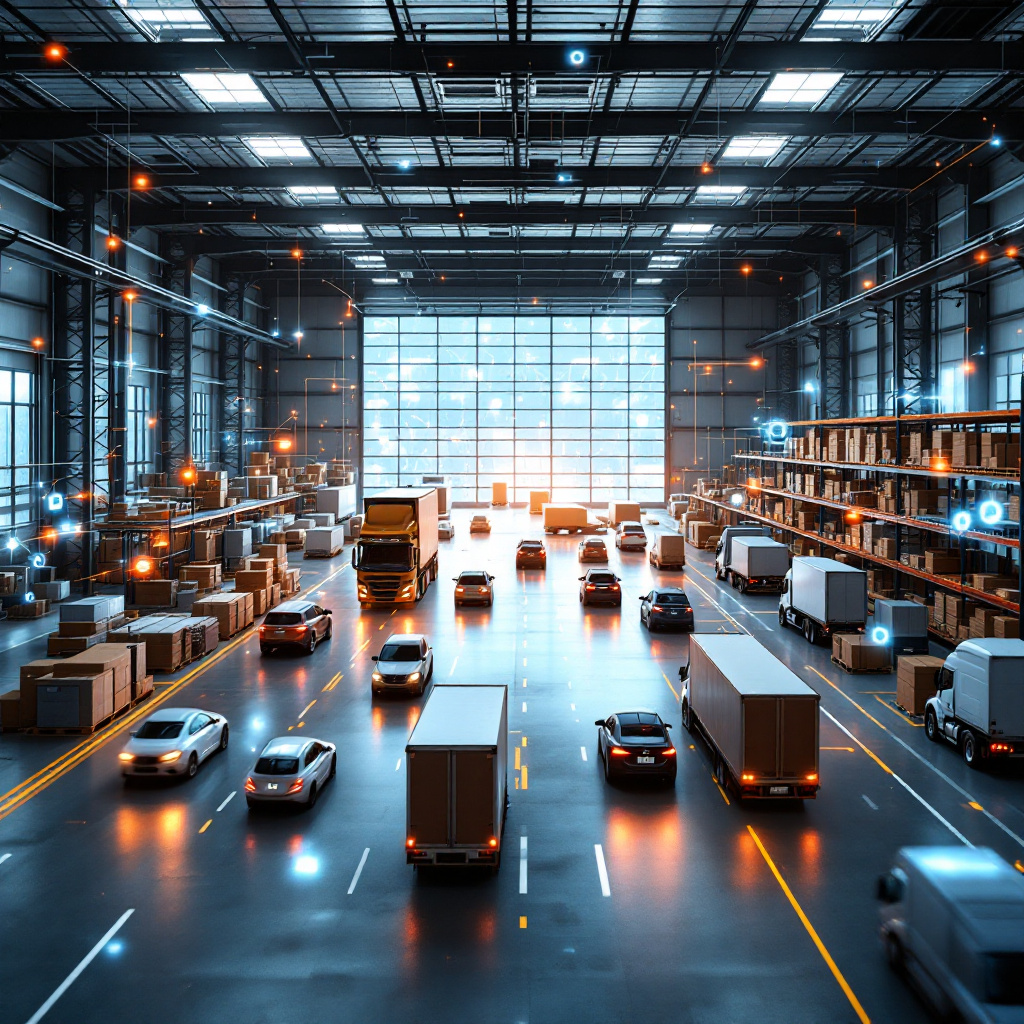AI in Logistics: Trends and AI Adoption
The logistics industry is undergoing rapid modernization, with AI adoption in logistics rising at a compound annual growth rate of over 40% through 2028. This growth is driven by a combination of economic and market forces, including cost pressures, increasingly high customer expectations, and persistent labour shortages. As a result, logistics firms are seeking innovative ways to improve supply chain efficiency and reduce costs, leading to a surge in demand for advanced AI-powered tools.
Core applications such as real-time tracking, predictive analytics, autonomous vehicles, and AI-based warehouse robotics are transforming logistics processes. For instance, predictive analytics enables supply chain operations to anticipate delays or disruptions before they occur, making it possible to adjust routes, inventory levels, and staffing dynamically. Similarly, AI-powered logistics solutions handle complex calculations for route optimization—reducing fuel consumption while improving delivery schedules. This is especially valuable for companies that must move shipments quickly across the global supply chain.
In modern logistics, AI is being used not only on the operations side but also in customer communication. Solutions like automated shipment updates help businesses keep their clients informed in real-time, removing manual effort from email communication. As AI use cases expand across the logistics sector, companies are increasingly looking at integrations that allow them to combine data from ERP, Transportation Management Systems (TMS), and IoT devices to create unified insights for better decision-making.
Adopting AI in logistics requires more than just buying software. Leaders must develop strategies for AI implementation that include staff training, data infrastructure upgrades, and thoughtful vendor selection. With AI adoption accelerating, logistics service providers that embrace AI and machine learning early will gain a significant competitive advantage, improving their ability to navigate supply chain disruptions and enhance overall logistics performance. Discover how top AI tools are already delivering measurable returns for logistics teams worldwide.
AI Tools for Logistics: Top AI Solutions
Several AI solutions for logistics are reshaping how logistics companies operate. Among the most notable are Blue Yonder Luminate, ClearMetal, Project44, FourKites, and Locus Robotics. Each AI platform delivers specialized functionality that addresses specific pain points in logistics operations, from demand forecasting and inventory management to real-time shipment visibility and warehouse automation.
Blue Yonder’s Luminate uses advanced AI algorithms and machine learning to create autonomous supply chains. It helps logistics firms predict disruptions and automatically adjust operations, leading to a reported 20% reduction in inventory costs and 15% improvement in service levels. ClearMetal, on the other hand, focuses on demand forecasting and inventory optimization, improving forecast accuracy by up to 30%. These tangible gains highlight the effectiveness of AI solutions in driving measurable business outcomes.
Project44 and FourKites both provide AI-driven supply chain visibility platforms. These tools offer predictive ETAs, anomaly detection, and global tracking. According to industry reports, Project44 users have reduced late deliveries by 25%, while FourKites customers have seen 18% improvements in on-time delivery. In the warehouse, Locus Robotics deploys autonomous mobile robots to automate picking processes, increasing productivity by up to 3x and lowering costs by 25%.
AI tools for logistics not only support traditional operational goals—they also enhance logistics communication. For example, AI-driven email drafting tools can integrate with ERP and WMS systems to provide accurate, consistent, and timely responses to clients, further elevating the customer experience. By combining AI in logistics applications, companies use technology to optimize workflows, cut costs, improve client satisfaction, and build resilience across the supply chain. Powered by AI, these solutions help logistics service providers transition toward more agile, data-driven operations.

Drowning in emails?
Here’s your way out
Save hours every day as AI Agents label and draft emails directly in Outlook or Gmail, giving your team more time to focus on high-value work.
AI in Inventory Management and Warehouse Automation
AI in inventory management is redefining how warehouses handle supply and demand. With the ability to forecast stock requirements with remarkable accuracy, AI systems enable supply chain planning that prevents both overstocking and costly stockouts. ClearMetal’s demand forecasting tools, for instance, integrate AI algorithms that detect patterns from multiple data sources, producing forecasts that improve turnover rates by 25–30%.
Warehouse automation is another area where AI solutions for logistics have generated substantial results. Locus Robotics, a leading AI-powered warehouse robotics provider, automates picking operations using advanced AI algorithms detect and direct autonomous mobile robots. These robots can triple picking productivity and reduce labor costs by around 25%. The combination of AI and machine learning in these scenarios ensures that pick-and-pack operations are completed swiftly and accurately, even during peak demand periods.
Integrating AI into the warehouse is not limited to hardware. AI platforms also connect to management systems like ERP or Warehouse Management Systems (WMS) to synchronize data across the logistics chain. This integration allows logistics teams to automate reporting, tracking, and communication with customers. Companies like virtualworkforce.ai help logistics service providers automate customer correspondence tied to inventory updates, ensuring responses are timely and backed by accurate operational data.
AI-driven tools in inventory and warehouse automation help logistics firms optimize supply chain operations, enabling greater efficiency and better service quality. By leveraging AI implementation strategies that include integration with existing systems, warehouses can enhance logistics workflow and meet growing e-commerce demands while maintaining operational control and quality assurance.
Route Optimization and Shipment with AI-Powered Logistics
Route optimization has long been a challenge for logistics service providers, but advanced AI algorithms are now transforming how deliveries are planned and executed. AI models analyze historical traffic patterns, current data from IoT sensors, weather updates, and fuel usage statistics to determine the most efficient delivery routes. The result is not only reduced travel time but also significant fuel savings, which contribute to sustainability goals.
Platforms like Project44 and FourKites offer predictive ETAs and anomaly detection powered by AI. According to industry data, these capabilities have cut late deliveries by as much as 25%. AI can help logistics teams proactively address potential delays, rerouting shipments in real time based on incoming data from telematics devices. This minimizes the risk of missed deadlines and enhances customer satisfaction.
AI-powered logistics solutions integrate with broader operational systems to ensure end-to-end visibility. Real-time shipment tracking allows dispatch managers to maintain constant awareness of cargo locations, further ensuring service reliability. For businesses, implementing AI to optimize shipping routes also means lower operational costs and better fleet utilization.
Beyond delivery management, route optimization tools can tie into internal processes, such as automated communication workflows that notify customers of updated ETAs or delivery changes. By connecting AI-driven logistics software with customer-facing platforms, companies optimize supply chain efficiency and deliver superior experiences. The ability to improve supply chain reliability through AI adoption sets the stage for more competitive and responsive logistics systems.

Drowning in emails?
Here’s your way out
Save hours every day as AI Agents label and draft emails directly in Outlook or Gmail, giving your team more time to focus on high-value work.
Generative AI in Logistics: Integrate AI Across the Supply Chain
Generative AI in logistics is paving the way for new forms of decision-making support. By simulating different demand scenarios and planning contingencies, these systems help logistics firms prepare for complex market conditions. Generative AI can also create optimized workflows that account for variables across the supply chain, from procurement to transport and warehousing, ensuring agility in the face of supply chain disruptions.
Integrating AI across the supply chain enables logistics companies to centralize decision-making and improve data-driven operations. AI-driven logistics platforms combine predictive analytics, route optimization, and inventory forecasts into unified dashboards. This integrated view gives managers greater control over logistics processes, from storage allocation in the warehouse to timing of last-mile deliveries.
Real-world examples show the strength of this approach. Some logistics firms combine AI-powered tools for shipment tracking with management systems to ensure smooth communication internally and with customers. The solution uses AI to generate reports, anticipate bottlenecks, and even create smart routing recommendations to reduce idle times. As advanced AI algorithms become more sophisticated, the effectiveness of AI solutions will only increase.
For logistics teams looking to enhance logistics efficiency and reduce costs, implementing AI end-to-end is a practical strategy. Tools like AI agents for logistics provide another layer of automation by connecting operational data with customer communication. By integrating AI effectively, logistics enhances service delivery, supports operational resilience, and positions companies ahead in the future of logistics innovation.
Logistics Challenges and the Future of Logistics with AI-Driven Logistics Systems
Despite the clear benefits, logistics challenges remain when implementing AI systems. Data silos between departments, resistance to change, and compliance with regional regulations can slow AI implementation. Additionally, ensuring that AI adoption is aligned with existing processes and workforce skills is crucial to avoid disruptions in service quality.
The future of logistics is likely to feature autonomous fleets, digital twins for supply chain operations, and self-learning networks that independently adjust to changing conditions. Logistics AI could help businesses model different operational strategies using AI-driven tools, providing a safe environment for testing without real-world consequences. The potential to optimize across the logistics value chain is immense.
To adopt AI in logistics successfully, experts recommend starting with pilot projects, performing thorough vendor evaluations, and investing in staff upskilling. Platforms like virtualworkforce.ai already help logistics firms reduce email workload in freight forwarding, providing operational relief while enhancing customer response times. Such targeted solutions prepare companies for broader supply chain AI integration.
As AI is revolutionizing modern logistics, the combination of AI applications across the logistics spectrum will continue to strengthen supply chain efficiency. By planning strategically and addressing challenges proactively, logistics systems can evolve toward a future where AI-powered logistics becomes the standard, enabling long-term resilience, agility, and customer satisfaction.
FAQ
What is AI in logistics?
AI in logistics refers to the use of artificial intelligence technologies such as machine learning, predictive analytics, and automation to improve logistics operations. It enhances efficiency, reduces costs, and supports better decision-making.
How does AI help in route optimization?
AI analyzes traffic, weather, and historical delivery data to recommend the fastest and most cost-effective routes. This reduces fuel consumption and improves delivery reliability.
Which are the top AI tools for logistics companies?
Some of the top AI tools for logistics companies include Blue Yonder Luminate, ClearMetal, Project44, FourKites, and Locus Robotics. Each offers unique capabilities like demand forecasting, shipment visibility, and warehouse automation.
Can AI improve warehouse operations?
Yes. AI-powered warehouse robots and management software can triple picking productivity and cut labor costs by a quarter. They also enhance inventory accuracy and space utilization.
What is supply chain visibility?
Supply chain visibility is the ability to track products, materials, and shipments in real time. AI tools enhance visibility by integrating data from multiple sources into a single platform.
How does generative AI apply to logistics?
Generative AI can simulate different logistical scenarios to aid contingency planning. It helps managers decide on optimal strategies when conditions change rapidly.
Is AI expensive to implement in logistics?
The cost depends on the scale and complexity of implementation. Many providers offer scalable solutions that allow companies to start small and expand as they see returns.
Can AI help with customer service in logistics?
Yes. AI can automate responses to customer inquiries and update them on shipment statuses instantly. Tools like virtualworkforce.ai integrate with operational systems to ensure accurate communication.
What are the challenges of AI adoption in logistics?
Challenges include integration with legacy systems, staff resistance, data silos, and regulatory compliance. Proper planning and phased implementation help mitigate these issues.
Will AI replace human workers in logistics?
AI is more likely to complement human workers by taking over repetitive and data-heavy tasks. This frees staff to focus on strategic decision-making and complex problem-solving.
Drowning in emails?
Here’s your way out
Save hours every day as AI Agents label and draft emails directly in Outlook or Gmail, giving your team more time to focus on high-value work.